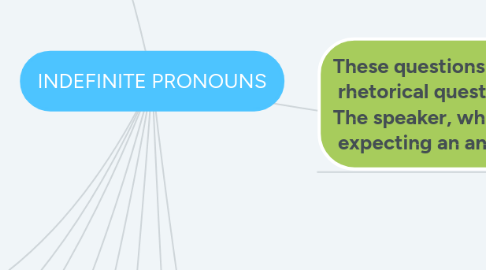
1. Negative sentences can only be formed with the indefinite pronouns that include any.
1.1. EXAMPLES
1.1.1. I not have anything to go buy.
1.1.2. They did not go anywhere last Tuesday.
1.1.3. I can not find anyone who is in your house.
2. Any and the indefinite pronouns formed with it can also be used in affirmative sentences with a meaning that is close to every: whichever person, whichever place, whichever thing, etc.
2.1. EXAMPLES
2.1.1. There is nowhere more beautiful than a landscape.
2.1.2. I can choose anything to carry.
2.1.3. I will go anybody you want to on vacation.
2.1.4. We will go anywhere you want in my car.
2.1.5. I would pay for anything without worrying
2.1.6. Carlos will follow you anywhere to see where he is.
3. AFFIRMATIVE
4. In affirmative sentences, indefinite pronouns using some are used to describe an indefinite quantity, the indefinite pronouns with every are used to describe a complete quantity, and the pronouns with no are used to describe an absence. Indefinite pronouns with noare often used in affirmative sentences with a negative meaning, but these are nevertheless not negative sentences because they are lacking the word not.
4.1. EXAMPLES
4.1.1. Everyone is in classes.
4.1.2. Someone is paying attention to the classes.
4.1.3. I put everything to my report.
4.1.4. She got something more than a job.
4.1.5. There is nothing for tomorrow.
4.1.6. I looked for you everywhere yesterday.
4.1.7. My notebook is somewhere in your house.
4.1.8. There is nowhere more beautiful than a landscape.
5. NEGATIVE SENTENCES
6. Many negative sentences that include an indefinite pronoun with any can be turned into affirmative sentences with a negative meaning by using an indefinite pronoun with no. However, there is a change in meaning with this transformation: the sentence that includes an indefinite pronoun with no is stronger, and can imply emotional content such as definsiveness, hopelessness, anger, etc.
6.1. EXAMPLES
6.1.1. I do not know anything about it. = neutral
6.1.2. I do not know nothing about all that. = defensive
6.1.3. I do not have anybody to go out with = neutral
6.1.4. I do not have nobody to be able to leave with = hopeless
6.1.5. There was thing we could do with everything. = neutral
6.1.6. There was nothing we could avoid. = defensive / angry
7. ..
8. NEGATIVE QUESTIONS
9. Indefinite pronouns do not refer to a specific person, place, or thing. In English, there is a particular group of indefinite pronouns formed with a quantifier or distributive preceeded by any, some, every and no.
9.1. All
9.1.1. everyone everybody
9.1.1.1. everywhere
9.1.1.1.1. everything
9.2. Part (positive)
9.2.1. someone somebody
9.2.1.1. somewhere
9.2.1.1.1. something
9.3. Part (negative)
9.3.1. anyone anybody
9.3.1.1. anywhere
9.3.1.1.1. anything
9.4. None
9.4.1. no one nobody
9.4.1.1. nowhere
9.4.1.1.1. nothing
10. These questions can be made even more definite if they are made negative. In this case, the speaker is absolutely certain he will receive the answer "Yes".
10.1. EXAMPLES
10.1.1. Wouldn't you like to go somewhere this weekend?
10.1.2. Didn't you lose something here?
10.1.3. Aren't you for somewhere?
10.1.4. Aren't these for someone today?
10.1.5. Couldn't somebody help me, here already?
11. Indefinite pronouns with every, some, and any can be used to form negative questions. These questions can usually be answered with a "yes" or a "no" Pronouns formed with anyand every are used to form true questions, while those with some generally imply a question to which we already know or suspect the answer.
11.1. EXAMPLES
11.1.1. Is there anything for us?
11.1.2. Did you go anywhere on vacation?
11.1.3. They everyone ready?
11.1.4. Have you seen him everywhere?
12. These questions can be turned in to false or rhetorical questions by making them negative. The speaker, when posing a question of this type, is expecting an answer of "no".
12.1. EXAMPLES
12.1.1. Isn't there anything to buy?
12.1.2. Didn't you go to anywhere house yesterday?
12.1.3. Aren't they everyone same?
12.1.4. Haven't you searched everywhere?
13. Some and pronouns formed with it is only used in questions to which we think we already know the answer, or questions which are not true questions (invitations, requests, etc.) The person asking these questions is expecting an answer of "Yes".
13.1. EXAMPLES
13.1.1. Am I looking for someone here?
13.1.2. Where did I lose something?
13.1.3. Are you going somewhere?
13.1.4. Could somebody help me with this? = request
13.1.5. Would you like to go somewhere with me? = invitation
